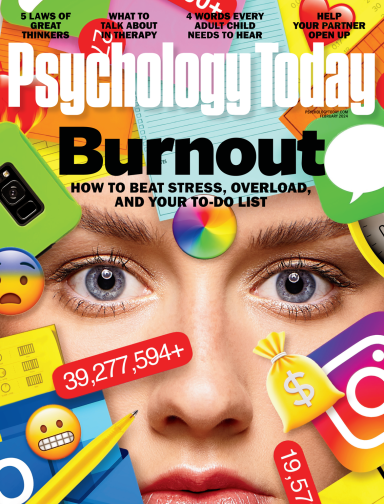Guilt
Rewriting the Narrative of Motherhood for Millennial Women
Millennial women are redefining what motherhood and balance can look like today.
Posted August 29, 2021 Reviewed by Devon Frye
Key points
- Millennial working mothers are being challenged to devise a new version of motherhood that requires less sacrifice and more self-awareness.
- Redefining the narrative of motherhood requires deep internal reflection about what you were taught about motherhood and where you stand with it.
- Community and support are valuable in working toward a redefined stance in how one shows up as a mother today.
It is well known that the thought of motherhood comes with certain assumptions from all walks of life—from the individuals who liken motherhood to a "ball and chain," to others who believe the journey is an invitation to a prestigious group. These days, many millennial women are finding that their assumptions were misguided—and it is through this realization that more and more people are trying to rewrite the narrative of motherhood.
Millennial women are redefining what motherhood and balance can look like. They are pushing themselves to take ownership of what motherhood means to them and not relying on the narrative that has been pushed on them by society: a narrative in which self-sacrifice is the main theme. Women and mothers have been taught that in order to be a good parent, they must completely neglect themselves. That means that they are expected to neglect themselves physically, mentally, and emotionally, as well as neglect their careers. It is because of this narrative that many women have opted to forgo having children.
However, women who do have children are trying to step away from the theme of self-neglect and instead embrace a form of motherhood that prioritizes their needs outside of that role. They are saying, “We can be moms, but also show up for ourselves as well.” Through that notion, we redefine the narrative of motherhood.
How Can We Redefine Motherhood?
Redefining motherhood starts by examining the way one views their own mother. When reflecting on the sacrifices made by the mothers or mother figures in your life, how do you feel? Do you feel pity for all they endured? Do you feel anger towards them for choosing martyrdom instead of strength? Do you feel proud of their selfless nature? Is there a conflicting feeling of all these emotions combined?
With this in mind, girls who grow up seeing their mother figures dim themselves in order to let their children shine may grow into women who view being a mother as losing the part of themselves that makes them special. Through examining the relationship between mother figure and daughter, one can find a balance between being a mother and being a person.
Millennial women today have opportunities to take care of themselves in a way their elders did not. With the inclusion of support in the form of wellness consultants, therapists, psychologists, and support groups, women today are able to better help themselves. They are realizing that society’s expectations of motherhood have been so unrealistically high that they have been figuratively shackled by these expectations for centuries. With these advancements in mind, the modern woman can change the way motherhood is performed.
When we talk about "rewriting the narrative of motherhood," it can seem like an abstract concept. The goal here is to define what that means for you as an individual. To start, here are five steps that will help you to begin to rewrite the narrative of motherhood.

Step 1: Who Taught You What You Know About Motherhood?
Figure out where you learned how to become a mom. If you don't know where you've come from, it's going to be hard to change the path ahead. Take a moment to yourself right now, and think to yourself “Where did I learn to become a mother?”
Many learn in more than one way. When watching their caregivers, they subconsciously take in what it means to be a mom from their childhood upbringing and family upbringing.
Another way women learn is through watching their peers who are mothers. When in spaces with these women, you may pay attention to how they show up in motherhood, the pressures that they feel, the expectations they place on themselves, and the ones people have of them.
Lastly, you learn what it means to be a mom from society. Through watching TV shows or commercials, listening to podcasts, or by observing how people in society talk about motherhood, you learn about what is expected of mothers.
Once again, you cannot make changes to your relationship with motherhood if you don't first recognize where your preconceived notions originate from.
Step 2: What Feels Right About What You've Learned?
When thinking about what you've learned, you should ask yourself what feels natural, organic, and right about the narratives you've observed and what does not. These reasons will be unique to you and will foster your individual relationship with motherhood. By proxy, it will also help create a guideline of what you want motherhood to resemble.
Step 3: What Can You Change?
Now that you've discovered what aspects of motherhood you like and the ones that you don't, you will have to decide which parts of this preconceived narrative you want to keep for your motherhood experience. In addition, you also have to decide which parts of you actively want to change.
For example, as a society, we are often taught that mothers have to cook, clean, and take care of the household while also being nurturing and emotionally receptive towards their children. For some, this will feel oppressive since it is a very high expectation for one person to fulfill. When realizing that this is the narrative that has been pushed through in a number of ways, the modern woman could redefine motherhood by recognizing her own aversion towards cooking and cleaning and promptly remove that aspect from what motherhood means to her.
Step 4: Recognizing Guilt
When you try to rewrite narratives of motherhood, you may start to feel guilty. You have to challenge and manage your guilt throughout this process.
Whether it be because you feel you are dishonoring your elders, because you are not performing in the way your peers are, or because of societal pressures, it's common to feel guilty for choosing a form of motherhood that is unique to your capabilities and needs. Know that guilt is a liar. It is only there to make you doubt yourself and the change that you are making in order to preserve your individuality. Keep in mind that the moment you decide to follow step one, you are rebelling against the pressures that tell you a mom should self-sacrifice and self-neglect.
When guilt rears its ugly head, you must take a moment to challenge that feeling and tell yourself that you are not doing anything wrong. You are doing something for yourself, and doing something for yourself is good for you and your family. Then, you move forward because you cannot allow the guilt to stop you in that moment. With time, you will begin to manage and walk with guilt more easily than before.
Unlearning the notion that motherhood is self-sacrifice is going to take some time. So, while you may never completely erase the guilt the creeps up on you, you can manage the feeling. With more practice in challenging your guilt, you'll likely realize that you can walk with it with more ease. As you start to modify parts of your motherhood experience, guilt is going to come and make you believe that you are doing something wrong. But this isn't true.
Step 5: Support
Finally, you have to seek support throughout the process. Motherhood alone can feel very isolating, but it can feel even more desolate when you add in the fact that you are trying to change what you've been taught about being a mother. The people that you would have otherwise sought support from may not be able to help you through this process since they may have accepted the societal pressures of motherhood. Therefore, you may have to build a community of additional support with like-minded people. As you travel on this journey, realize that you do not have to do it alone.
You can find support through programs such as Balanced Working Mama which specializes in rewriting the narrative of motherhood. Too many women have gone through life not prioritizing themselves, but you can have a community of women who have also discovered their power and knowledge to change this.
I hope these tips will help to push you along the journey of rewriting the narrative of motherhood.




